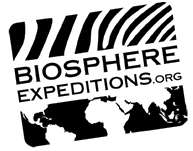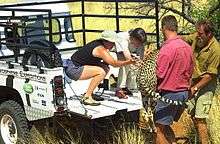Biosphere Expeditions

Biosphere Expeditions is a wildlife research and conservation non-profit organization whose main focus is to conserve the biosphere with volunteer-led scientific conservation expeditions to several countries around the world. It was founded in 1999.
Goals and Projects
Biosphere Expeditions states its purpose as the promotion of sustainable conservation of the planet's wildlife by involving the public, with scientists across the globe on real hands-on wildlife research and conservation expeditions. Expeditions typically place interested people with no research experience alongside scientists widely accepted to be at the forefront of their conservation work. Anyone may join an expedition as there are neither special skills or fitness requirements nor age limitations.
Biosphere Expeditions also advocates sustainable tourism.
Biosphere Expeditions is listed as currently working in eight countries around the world; Oman, Honduras, Portugal (or more specifically the Azores), Spain, the Altai Republic, Slovakia, Namibia and Brazil.

Biosphere Expeditions receives funding from both contributions made by volunteers joining expeditions and grants from corporate partners. Consequently, the organization’s expeditions have an independence from government and other restrictive grants. Likewise, Biosphere Expeditions makes these projects feasible, whereas funding for such projects would otherwise seem hard to obtain. Each expedition works with one or more local scientists and focuses on wildlife conservation and research, typically involving flagship species such as the snow leopard, cheetah, dolphins, whales, coral reefs, wolf and bear.
Biosphere Expeditions strives to make major contributions to research projects which otherwise would not take place without the organization’s support. The research on cetaceans in the Azores represent two such examples.
• This research was historically carried out annually during the period from late May to September. Since 2004, by reason of Biosphere Expeditions’ support through its volunteers and funding, the researchers expanded the width of the observation window by beginning in early April instead of late May. This extended period resulted in adding significant research data from the hundreds of sightings of rare animals such as baleen whales (blue, fin, sei, humpback and minke whales).
• The researchers typically add photo identification pictures of these animals to an international photo database of photos, known as the Photo ID Catalogue. Matthias Hammer, Biosphere Expeditions’ founder, states, “Animals passing the Azores are possibly going up to Iceland or Scandinavia, so we see these expeditions as vital in helping to both plot migration routes and estimate numbers.” Most project scientists believe it is only a matter of time before they can match animals seen in different years and/or different geographical locations. Expedition members for this project made a significant contribution by augmenting sperm whale research with their testing and validating computer software designed to match individual animals utilizing photographic imaging, similar to a facial recognition system, which compares other body features, such as the flukes, contained in the digital photographs. With several thousand sperm whale photo ID pictures in the North Atlantic catalogue, the success of this program will significantly reduce lab time by eliminating the manual visual comparisons.
History

Biosphere Expeditions was founded in 1999 by Matthias Hammer. The first expedition took place in Poland’s Carpathian Mountains during 2001. The project focused on wolves in the area and was instrumental in establishing a wolf hunting ban there. Soon thereafter, Biosphere Expeditions’ portfolio grew and the organization opened additional offices in Germany, France, Australia and the United States.
In 2006, Biosphere Expeditions won the Best Volunteering Organisation award at the First Choice Responsible Tourism Awards held in London, followed by a "Highly Commended" award in the "Best for Protection of Endangered Species" category a year later.
Media
- Index of media coverage
- Here be snow leopards
- A game of cat and mouse
- Erin McCloskey's Namibian wildlife encounter
- Back from the wilderness
- The rare twitch project
- High time to sea
- Eco hero
- http://www.abendblatt.de/daten/2006/06/03/569998.html (German)
Awards
Expedition reports
See also
External links
- Biosphere Expeditions
- First Choice Responsible Tourism Awards 2006
- HCRF, local partner in Honduras
- Diwan of Royal Court, local partner in Oman
- Whale Watch Azores, local partner in Portugal
- Tambopata Expeditions, local partner in Peru
- Carpathian Wildlife Society, local partner in Slovakia EEAA
- Projecto Puma, local partner in Brazil
- Woodsmoke, local partner providing wilderness skills training for expedition leaders